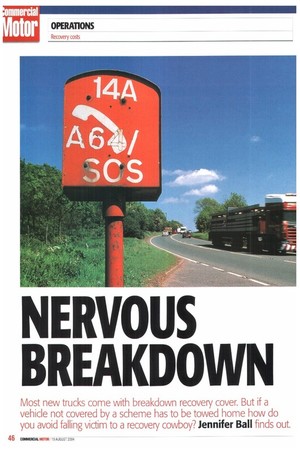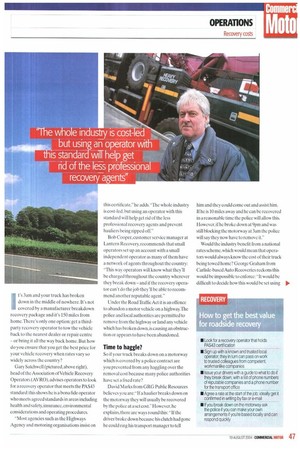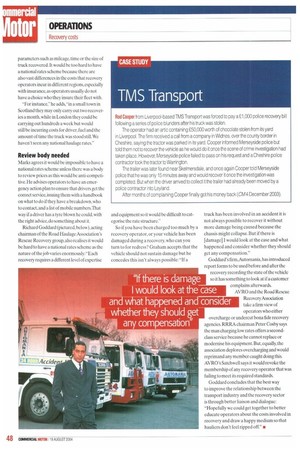NERVOUS BREAKDOWN
Page 46

Page 47

Page 48

If you've noticed an error in this article please click here to report it so we can fix it.
Most new trucks come with breakdown recovery cover. But if a vehicle not covered by a scheme has to be towed home how do you avoid falling victim to a recovery cowboy? Jennifer Ball finds out.
1 t's 3am and your truck has broken down in the middle of nowhere, It's not covered by a manufacturer breakdown recovery package and it's 150 miles from home.There's only one option: get a thirdparty recovery operator to tow the vehicle back to the nearest dealer or repair centre —or bring it all the way back home. But how do you ensure that you get the best price for your vehicle recovery when rates vary so widely across the country?
Gary Satchwell (pictured, above right), head of the Association of Vehicle Recovery Operators (AVRO), advises operators to look fora recovery operator that meets the PAS43 standard: this shows he is a bona fide operator who meets agreed standards in areas including health and safety, insurance, environmental considerations and operating procedures.
"Most agencies such as the Highways Agency and motoring organisations insist on this certificate," he adds.-The whole industry is cost-led, but using an operator with this standard will help get rid of the less professional recovery agents and prevent hauliers being ripped off.
Bob Cooper, customer service manager at Lantern Recovery, recommends that small operators set up an account with a small independent operator as many of them have a network of agents throughout the country: "This way operators will know what they'll be charged throughout the country wherever they break down — and if the recovery operator can't do the job they'll be able to recommend another reputable agent."
Under the Road Traffic Act it is an offence to abandon a motor vehicle on a highway.The police and local authorities are permitted to remove from the highway or land any vehicle which has broken down, is causing an obstruction or appears to have been abandoned.
Time to haggle?
So if your truck breaks down on a motorway which is covered by a police contract are you prevented from any haggling over the removal cost because many police authorities have set a fixed rate?
David Marks from GRG Public Resources believes you are:-If a haulier breaks down on the motorway they will usually be recovered by the police at a set cost." However, he explains, there are ways round this: "If the driver broke down because his clutch had gone he could ring his transport manager to tell him and they could come out and assist him. If he is 10 miles away and he can be recovered in a reasonable time the police will allow this. However, if he broke down at 9pm and was still blocking the motorway at 3am the police will say they now have to remove it.'
Would the industry benefit from a national rates scheme, which would mean that operators would always know the cost of their truck being towed home? George Graham from Carlisle-based Auto Recoveries reckons this would be impossible to enforce: "It would be difficult to decide how this would be set using parameters such as mileage, time or the size of truck recovered. It would be too hard to have a national rates scheme because there are also vast differences in the costs that recovery operators incur in different regions,especially with insurance, as operators usually do not have a choice who they insure their fleet with.
"For instance." he adds,"in a small town in Scotland they may only carry out two recoveries a month,while in London they could be carrying out hundreds a week but would still be incurring costs for driver, fuel and the amount of time the truck was stood still.We haven't seen any national haulage rates.
Review body needed
Marks agrees it would be impossible to have a national rates scheme unless there was a body to review prices as this would be anti-competitive. He advises operators to have an emergency action plan to ensure that drivers get the correct service, issuing them with a handbook on what to do if they have a breakdown, who to contact, and a list of mobile numbers.That way if a driver has a tyre blown he could, with the right advice, do something about it.
Richard Goddard (pictured, below), acting chairman of the Road Haulage Association's Rescue Recovery group, also realises it would be hard to have a national rates scheme as the nature of the job varies enormously; "Each recovery requires a different level of expertise and equipment so it would be difficult to categorise the rate structure."
So if you have been charged too much by a recovery operator, or your vehicle has been damaged during a recovery, who can you turn to for redress? Graham accepts that the vehicle should not sustain damage but he concedes this isn't always possible: "If a truck has been involved in an accident it is not always possible to recover it without more damage being caused because the chassis might collapse. But if there is [damage] I would look at the case and what happened and consider whether they should get any compensation."
Goddard's firm,Automania, has introduced report forms to be used before and after the recovery recording the state of the vehicle so it has something to look at if a customer complains afterwards.
AVRO and the Road Rescue Recovery Association take a firm view of operators who either overcharge or undercut bona fide recovery agencies. RRRA chairman Peter Cosby says the man charging low rates offers a secondclass service because he cannot replace or modernise his equipment. But, equally, the association deplores overcharging and would reprimand any member caught doing this. AVRO's Satchwell says it would revoke the membership of any recovery operator that was failing to meet its required standards.
Goddard concludes that the best way to improve the relationship between the transport industry and the recovery sector is through better liaison and dialogue: "Hopefully we could get together to better educate operators about the costs involved in recovery and draw a happy medium so that hauliers don't feel ripped off" •




























































































































































































